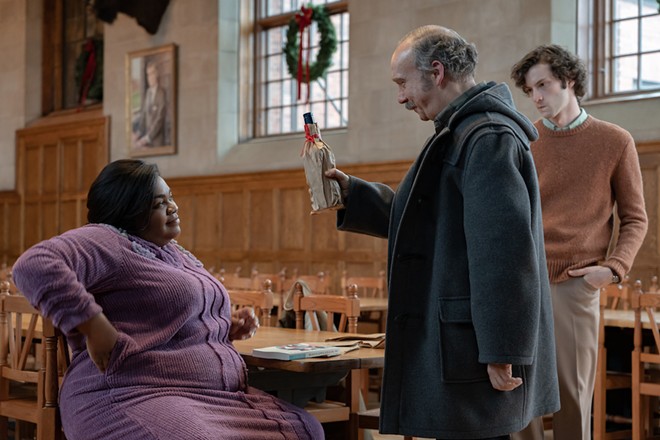
Describing Alexander Payne as underrated clearly exaggerates the case: After all, among his many laurels, he’s shared a pair of Oscars for Best Screenplay and earned three nominations as a director.
But Payne never quite receives the fannish adulation showered on such filmmaking contemporaries as Paul Thomas Anderson, David Fincher, Quentin Tarantino and Wes Anderson. The modestly scaled, almost self-effacing dramedies in which Payne specializes lack the flash, scope and overt stylization that characterize his peers’ most celebrated films, but no one, I would forcefully argue, has produced a more consistently fine body of work over the past 25 years, an unbroken string of excellence stretching from Citizen Ruth in 1996 to his newest triumph, The Holdovers.
The premise of The Holdovers — dyspeptic teacher peevishly supervises a handful of students forced by unfortunate circumstance to stay bunkered at their New England boarding school during the Christmas holidays — could easily tip over into either the madcap or the maudlin. Characteristically, Payne avoids the extremes: Like a modern-day Leo McCarey (Going My Way, Make Way for Tomorrow), he seamlessly blends comic and dramatic moments, often within a scene, to achieve perfect equipoise.
Paul Giamatti, who also winningly teamed with Payne for 2004’s Sideways, stars as Paul Hunham, an adjunct professor of ancient history press-ganged into service as chaperone at Barton Academy during the 1970 Christmas break. Disdainful of his students, whom he regards (with some justification) as entitled and willfully ignorant, Hunham had planned to spend his time reading in blissful isolation, not riding herd over a quintet of abandoned boys. And his charges are scarcely happier: Not only are the holdovers bereft of family and trapped at school, Hunham — the most demanding, least liked member of the faculty — seems intent on making them bend like Bob Cratchit to his Scrooge-like rules.
In a minor Christmas miracle, after several days of Hunham’s bah-humbuggery, Santa seems to deliver everyone an early gift when one student’s wealthy father unexpectedly helicopters in and offers to whisk the lot of them to a ski resort. However, the mother and stepfather of Hunham’s charge Angus Tully (Dominic Sessa) — vacationing on a delayed honeymoon — can’t be reached to grant permission, and he watches with forlorn resentment as his fellow prisoners ascend to the sky and escape to the slopes. Hunham and Tully now form a tight trio of misery with the school’s only other holiday resident, head cook Mary Lamb (Da’Vine Joy Randolph), who’s opted to cocoon in her apartment at Barton while mourning the recent death of her son in Vietnam.
The enforced intimacy of their confinement eventually produces — with Mary’s occasional prodding — a tentative rapprochement between antagonistic student and teacher. Both remain prickly and guarded, but Paul and Angus develop a grudging mutual respect as shared characteristics (outsized intelligence, fear of inadequacy, impulsiveness, adeptness at dissembling, poorly suppressed rage, depression) keep revealing themselves.
As Paul’s own narrow focus begins to widen, The Holdovers incrementally ventures into the larger world after a first half spent largely within Barton’s confining walls. Although initially compelled to leave the school for an emergency-room visit, Paul then allows Angus a follow-up dinner in town. That meal in turn leads to a holiday-party invitation from Barton administrative staffer Lydia Crane (the delightful Carrie Preston), who’s moonlighting over break as a waitress at the restaurant. And, finally, following their attendance at Lydia’s eventful and catalytic gathering, Paul, Angus and Mary embark on a trip to Boston, with The Holdovers belatedly morphing into another of Payne’s road films (About Schmidt, Sideways, The Descendants, Nebraska) in which movement prompts revelations to occur and the course of lives to alter.
A devotee of ’70s American cinema, Payne has long produced films that evoke the qualities of that era’s defining work: genre-defying, character-driven, discursive, open-ended, at once antic and melancholic, humanistic. The Holdovers makes Payne’s admiration for the directors who created many of those films — Robert Altman, Bob Rafelson, Michael Ritchie and especially Hal Ashby — even more explicit. The Holdovers is not only set in 1970, but also consciously emulates the period’s 35mm film grain, analog sound and formal devices (such as its lovely lap-dissolve transitions and startling use of a sudden zoom-out), with Ashby’s The Last Detail — a Payne favorite — exerting a particularly powerful influence.
But as accomplished as the film is visually and aurally — including the spot-on score and song choices — what most distinguishes The Holdovers are its central performances. No one who’s seen Giamatti in American Splendor will find it surprising that he’s an effective curmudgeon, but his Paul Hunham never reduces to type. A high-functioning alcoholic with an array of physical maladies that make him acutely self-conscious, Paul uses cutting insults as a protective barrier: However isolating, they shield him from others’ contempt and judgment. But Giamatti allows us to see Paul’s wounded vulnerability through cracks in that wall, with pain, longing and empathy briefly visible in unguarded moments.
Da’Vine Joy Randolph is less of a known quantity — I was primarily familiar with her sterling comedic work in Dolemite Is My Name and Only Murders in the Building — but perhaps even more impressive as the bereaved Mary. Reserved but formidable, with a sardonic wit, Mary keeps her grief carefully dammed until a combination of too many drinks and a recording of Artie Shaw’s “When Winter Comes” opens the floodgates. In the aftermath, Mary sits in quiet contemplation, and Payne smartly holds on a medium close-up of Randolph as a devastating cascade of emotions washes over her expressive face. And while newcomer Dominic Sessa understandably fails to climb to the same thin-air heights of Giamatti and Randolph, he achieves impressive altitude on his first flight.
A mixologist of rare skill, Payne concocts a cinematic Negroni in The Holdovers — a bittersweet drink both piquant and intoxicating.
Subscribe to Cleveland Scene newsletters.
Follow us: Apple News | Google News | NewsBreak | Reddit | Instagram | Facebook | Twitter | Or sign up for our RSS Feed









